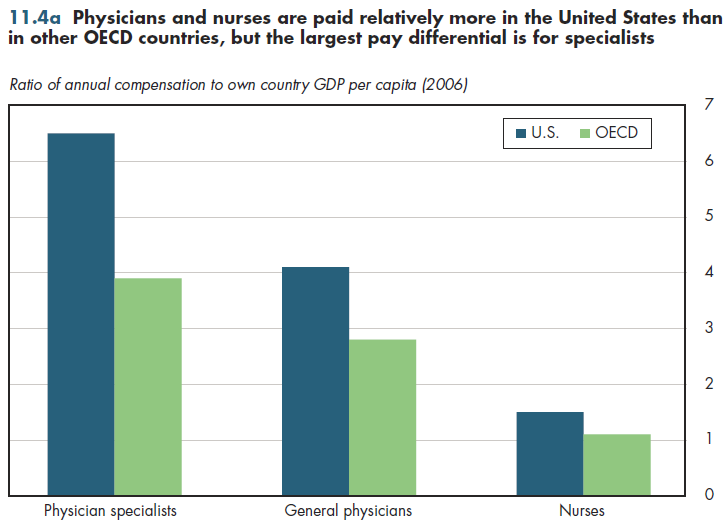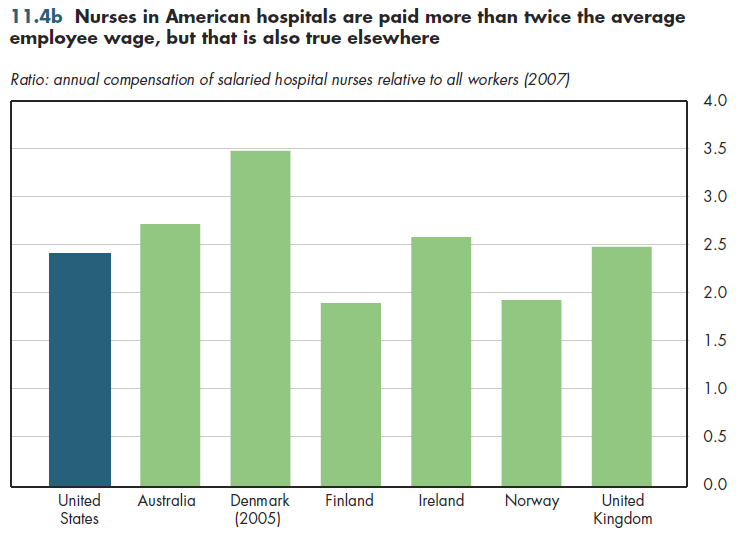Download PowerPoint versions of both figures.
Inside Collection (Book): American Health Economy Illustrated
11.4 US Health Professionals Are Paid Higher than Other Industrialized Countries
Summary: Health professionals in the United States have much higher relative incomes than do their counterparts in other industrialized countries.
In general, the United States pays higher prices for health labor than are paid else- where. The price differential varies a great deal, depending on the category of health professional examined. The average annual remuneration of physician specialists in the United States is more than six times the nation's GDP per capita (which was approximately $46,000 in 2009). Physician specialists in OECD countries for which such data are available also are well paid, but the comparable ratio to GDP per capita is less than four to one (figure 11.4a). Alternatively, even accounting for the fact that the United States has higher wages and GDP per capita than the OECD comparators have, U.S. specialists, relatively speaking, are paid 50 percent more than their counterparts in competitor nations receive.

A similar result with less pronounced differences can be told for general physicians. In the United States, their relative compensation is the same as the average compensation of specialists in the OECD. Generalist physicians in the OECD earn on average less than three times per capita GDP in their own country. Thus, U.S. physician generalists are paid in relative terms almost 50 percent more than physicians in other industrialized nations receive.
The U.S. pay differential shrinks further in the case of nurses. U.S. nurses, on average, are paid approximately 50 percent more than GDP per capita, whereas in the OECD they are paid approximately 10 percent more on average. Thus, a typical U.S. nurse earns approximately 30 percent more than do counterparts in the OECD.
More detail illustrates some of the variation masked by using averages. The annual compensation for nurses employed in American hospitals is almost 2.5 times as high as that for the average U.S. worker (figure 11.4b). This is the same as the relative compensation of nurses in the UK. Although relative nurse pay is lower in some other countries (Finland and Norway), it is higher in Australia, Denmark, and Ireland. U.S. health workers generally are compensated well in absolute and relative terms. Even so, this does not imply that U.S. prices for health labor necessarily are the highest in the world when taking into account the earnings or resources available to the rest of a nation's workers or population.

Downloads
References
- Author's calculations.
- Organisation for Economic Co-operation and Development.
Collection Navigation
- « Previous module in collection 11.3 Employee Compensation in Ambulatory Health Sector Grew Slowly
- Collection home: American Health Economy Illustrated
- Next module in collection » 11.5 Rise in US Rates of Return for Medical Education
Content actions
Give feedback:
Download:
Add:
Reuse / Edit:
Twin Cities Campus:
- © 2012 Regents of the University of Minnesota. All rights reserved.
- The University of Minnesota is an equal opportunity educator and employer. Privacy
- Last modified on Sep 26, 2013 2:13 pm -0500









